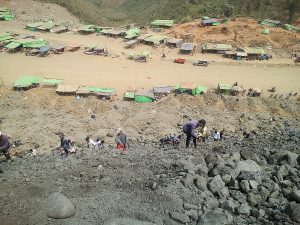Myanmar’s military tightened its control over the country’s lucrative jade industry in the run up to its February 1 coup, swelling the coffers of the army and personally enriching its top brass, according to a new report from the U.K.-based watchdog Global Witness.
In the report, which was released yesterday, Global Witness examines the dynamics of the country’s multibillion-dollar jade industry since the 2015 election that brought Aung San Suu Kyi’s National League for Democracy (NLD) to office in a landslide. It shows how Myanmar’s military and other armed groups began tightening their grip on the jade trade under the NLD administration, even as the latter attempted to reform the notoriously opaque industry.
Since the coup d’etat in February, the report states, Myanmar’s jade sector “has become more corrupt than ever, stoked violent conflict throughout the country and helped fill the military’s coffers,” including those of coup leader Sen. Gen. Min Aung Hlaing and his family.
“The military coup has triggered a new wave of violence in the conflict-ridden sector, demonstrating the danger of armed actors controlling the multibillion-dollar mining industry,” the report states.
As Global Witness has documented in past reports, jade from Kachin State in northern Myanmar is central to the country’s destructive political economy. For years, the sector has generated billions of dollars in annual revenue, mostly from sales to neighboring China, where the luminous blue-green mineral is highly prized. This flow of dark money has funded conflicts outside of jade mining regions and given the military, or Tatmadaw, access to a rich source of revenue.
The report examines how, shortly after taking office in 2016, the NLD government suspended all jade mining licensing and initiated a thorough review of Myanmar’s regulation of the trade in jade and gemstones. The spur for its review was a series of deadly mining accidents that killed hundreds of workers in Hpakant, the epicenter of Kachin State’s jade industry.
Like water finding its lowest point, however, flows of illicit jade wealth simply trickled around the NLD government’s proposed regulations. Despite the licensing suspension and strong pressure from activist groups, environmentalists, and foreign governments to clean up the lucrative industry, “military companies and their business allies frequently ignored the licensing suspension and resisted reform at every turn in order to further expand their already dominant role in the industry.”
In the months before the NLD took office in March 2016, the military-backed government presided over a massive sell off of jade licenses. Chief among the beneficiaries was the military-linked conglomerate Myanmar Economic Holdings Limited (MEHL), which has recently been sanctioned by several governments, including the United States and United Kingdom.
According to Global Witness, at the time of the licensing suspension, MEHL was the single largest holder of active jade mining permits, controlling 1,100 of them, 58 percent of which it had obtained in the months leading up to the beginning of the NLD’s term.
Even once the licensing suspension was in place, Myanmar’s military colluded with ethnic armed groups, including the Kachin Independence Organization (KIO) and the powerful United Wa State Army (UWSA), to circumvent the new restrictions. Together, they facilitated illegal mining, bribery, and smuggling in order to “ensure all three groups, and their allies, would continue to receive their slice of Kachin’s jade wealth.”
The fact that the Tatmadaw and the KIO were willing to cooperate while in a state of open conflict gives some sense of how central jade revenues are to the political economy of conflict in Myanmar. These efforts also resulted in an accelerated pace of jade mining and increasing violation of what few safety protocols existed, contributing to the tragic landslide in Hpakant last July, which killed at least 174 miners. Another result was to push the jade industry even further from effective regulation. Global Witness notes that up to 90 percent of all jade mined in Hpakant is now smuggled out of the country and into China without ever entering the formal system in Myanmar.
These developments are bad news for those seeking to reverse February’s coup or sanction the military junta into submission. Indeed, in a climate of increasing isolation from the democratic West, jade looms as the junta’s trump, granting it a guaranteed income of billions of dollars per year, and the possibility of dispensing them in order to raise further revenue or cement political alliances.
While recognizing that the recent coup has made an already challenging goal “more difficult,” Global Witness concludes its report with a call for foreign governments to impose additional targeted sanctions on the Tatmadaw’s economic interests, in addition to the raft of restrictions that have already been imposed. Given that the lion’s share of jade is unofficially exported to China, however, the trade is largely beyond the reach of the governments with the greatest motivations to do something about it.

































